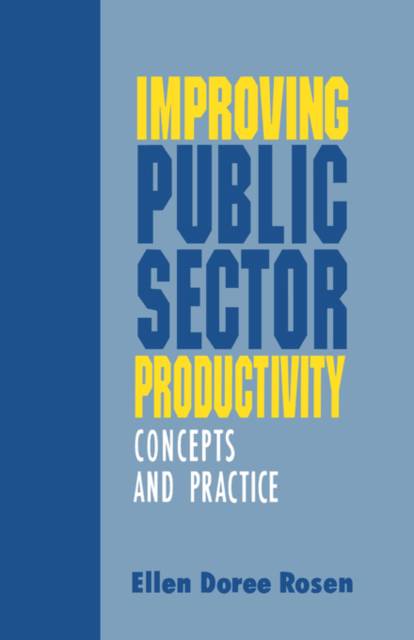
- Retrait gratuit dans votre magasin Club
- 7.000.000 titres dans notre catalogue
- Payer en toute sécurité
- Toujours un magasin près de chez vous
- Retrait gratuit dans votre magasin Club
- 7.000.0000 titres dans notre catalogue
- Payer en toute sécurité
- Toujours un magasin près de chez vous
Improving Public Sector Productivity
Concepts and Practice
Ellen Doree Rosen, Rosen, Ellen D Rosen
Livre broché | Anglais
216,95 €
+ 433 points
Description
The productivity of America′s public agencies has never been more closely scrutinized. Taxpayers have drawn the line on what they are--and are not--willing to pay for governmental programs. Both public servants and their clients have an equal stake in making public agencies more productive and respected. Public agencies can be made more efficient, effective, and humane, and Improving Public Sector Productivity shows how. Ellen Rosen provides practical guidance to enhance both the service quality and client satisfaction of public agencies at the local, state, and national level. A wealth of current cases and examples focuses on the issues of quality management, improving service delivery, job reorganization, and worker empowerment. The author also details methods for measuring public productivity. Policymakers, public sector managers, researchers, and students of public administration will find Improving Public Sector Productivity an indispensable toolkit of ideas, strategies, and applications for making better use of taxpayers′ money. "This book is a welcome addition to the literature because it offers practical solutions as well as discussing theoretical issues. . . .The book is aimed at the serious student and practitioner of public administration and because it is written in a way that combines theory with practice, it is accessible to this audience. --Urban Studies "Managers and elected officials will find a ′tool-kit′ of ideas, strategies, and applications for making better use of taxpayers′ money--all based on sound rationale and of proven worth. The productivity concerns provided in the book can help improve service quality and client satisfaction, while being sensitive to employee concerns and asking them to contribute to the enterprise." --Beverly A. Cigler, The Pennsylvania State University "Ellen Doree Rosen′s book, Improving Public Sector Productivity, Concepts, and Practice provides some very useful information and ideas on how to attain higher levels of productivity. The book succeeds, however, in clearly explaining the many constraints on public administration which militate against achieving high levels of focus and efficiency. Improving the Public Sector Productivity et al. is thought provoking, intelligent, and one of the more practical public administration texts I′ve read. I recommend it to professors and students for its clear-eyed description of the issues practitioners must deal with in attempting to improve the way public business is conducted. It is a superior guide for those in the field who could often use a conceptual framework to help assess where we are and to mark a path in the direction we need to go." --Mark Miller, Orange County Chapter of the American Society of Public Administration
Spécifications
Parties prenantes
- Auteur(s) :
- Editeur:
Contenu
- Nombre de pages :
- 288
- Langue:
- Anglais
Caractéristiques
- EAN:
- 9780803945739
- Date de parution :
- 01-07-93
- Format:
- Livre broché
- Format numérique:
- Trade paperback (VS)
- Dimensions :
- 142 mm x 214 mm
- Poids :
- 408 g

Les avis
Nous publions uniquement les avis qui respectent les conditions requises. Consultez nos conditions pour les avis.






